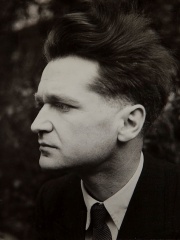
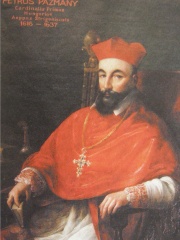


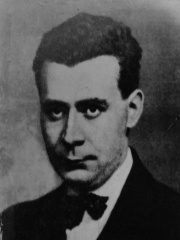
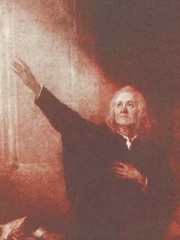
The Most Famous
PHILOSOPHERS from Romania
This page contains a list of the greatest Romanian Philosophers. The pantheon dataset contains 1,267 Philosophers, 7 of which were born in Romania. This makes Romania the birth place of the 28th most number of Philosophers behind Switzerland, and Ireland.
Top 7
The following people are considered by Pantheon to be the most legendary Romanian Philosophers of all time. This list of famous Romanian Philosophers is sorted by HPI (Historical Popularity Index), a metric that aggregates information on a biography's online popularity.

1. Emil Cioran (1911 - 1995)
With an HPI of 78.22, Emil Cioran is the most famous Romanian Philosopher. His biography has been translated into 54 different languages on wikipedia.
Emil Cioran (; Romanian: [eˈmil tʃoˈran] ; French: [emil sjɔʁɑ̃]; 8 April 1911 – 20 June 1995) was a Romanian philosopher, aphorist and essayist, who published works in both Romanian and French. His work has been noted for its pervasive philosophical pessimism, style, and aphorisms. His works frequently engaged with issues of suffering, decay, and nihilism. In 1937, Cioran moved to the Latin Quarter of Paris, which became his permanent residence, wherein he lived in seclusion with his partner, Simone Boué, until his death in 1995.

2. Péter Pázmány (1570 - 1637)
With an HPI of 63.10, Péter Pázmány is the 2nd most famous Romanian Philosopher. His biography has been translated into 25 different languages.
Péter Pázmány de Panasz, S.J. (Hungarian: panaszi Pázmány Péter, pronounced [ˈpɒnɒsi ˈpaːzmaːɲ ˈpeːtɛr]; Latin: Petrus Pazmanus; German: Peter Pazman; Slovak: Peter Pázmaň; 4 October 1570 – 19 March 1637), was a Hungarian Jesuit who was a noted philosopher, theologian, cardinal, pulpit orator and statesman. He was an important figure in the Counter-Reformation in Royal Hungary. Pázmány's most important legacy was his creation of the Hungarian literary language. As an orator he was dubbed "the Hungarian Cicero in the purple". In 1867, a street in Vienna, the Pazmanitengasse, was named after him.

3. Georges Politzer (1903 - 1942)
With an HPI of 62.96, Georges Politzer is the 3rd most famous Romanian Philosopher. His biography has been translated into 20 different languages.
Georges Politzer (French: [pɔlitsɛʁ]; born Politzer György, Hungarian: [ˈpolitsɛr ˈɟørɟ]; 3 May 1903 – 23 May 1942) was a Hungarian-born French philosopher and Marxist theoretician of Hungarian Jewish origin, affectionately referred to by some as the "red-headed philosopher" (philosophe roux). He was a native of Oradea, a city in present-day Romania (then Nagyvárad, Kingdom of Hungary). He was murdered in Fort Mont-Valérien in Suresnes in the Holocaust.

4. Lucien Goldmann (1913 - 1970)
With an HPI of 62.22, Lucien Goldmann is the 4th most famous Romanian Philosopher. His biography has been translated into 19 different languages.
Lucien Goldmann (French: [ɡɔldman]; 20 July 1913 – 8 October 1970) was a French philosopher and sociologist of Jewish-Romanian origin. A professor at the EHESS in Paris, he was a Marxist theorist. His wife was sociologist Annie Goldmann.
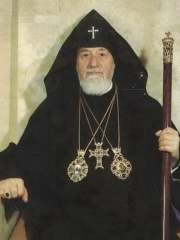
5. Vazgen I (1908 - 1994)
With an HPI of 61.62, Vazgen I is the 5th most famous Romanian Philosopher. His biography has been translated into 23 different languages.
Vazgen I also Vazken I of Bucharest (Armenian: Վազգէն Ա Բուխարեստցի), born Levon Garabed Baljian (Լևոն Կարապետ Աբրահամի Պալճյան; September 20, 1908 – August 18, 1994) was the Catholicos of All Armenians between 1955 and 1994, for a total of 39 years, the 4th longest reign in the history of the Armenian Apostolic Church. A native of Romania, he began his career as a philosopher, before becoming a Doctor of Theology and a member of the local Armenian clergy. The leader of the Armenian Apostolic Church hierarchy in Romania, he became Catholicos in 1955, moving to Soviet Armenia. Vazgen I led the Armenian Church during the dissolution of the Soviet Union, and was the first Catholicos in newly independent Armenia.

6. Lucian Blaga (1895 - 1961)
With an HPI of 61.31, Lucian Blaga is the 6th most famous Romanian Philosopher. His biography has been translated into 28 different languages.
Lucian Blaga (Romanian: [lutʃiˈan ˈblaɡa] ; 9 May 1895 – 6 May 1961) was a Romanian philosopher, poet, playwright, poetry translator and novelist. He is one of the most important philosophers and poets of Romania, and a prominent philosopher of the interwar period in Eastern Europe who, due to the unfortunate circumstances surrounding his career, is barely known to the outside world.

7. Ferenc Dávid (1510 - 1579)
With an HPI of 60.28, Ferenc Dávid is the 7th most famous Romanian Philosopher. His biography has been translated into 18 different languages.
Ferenc Dávid (also rendered as Francis David or Francis Davidis; born as Franz David Hertel, c. 1520 – 15 November 1579) was a preacher and theologian from Transylvania, the founder of the Unitarian Church of Transylvania, and the leading figure of the Nontrinitarian Christian movements during the Protestant Reformation. He disputed the mainstream Christian doctrine of the Trinity, believing God to be one and indivisible. Studying Catholic theology in Wittenberg and in Frankfurt an der Oder, he was first ordained as a Roman Catholic priest, later he became a Lutheran minister and then a Calvinist bishop in the Principality of Transylvania. Throughout his career as a Christian theologian and professor, Dávid learnt the teachings and practices of the Roman Catholic and Magisterial Protestant churches, but later rejected several of them and came to embrace Unitarianism.
People
Pantheon has 7 people classified as Romanian philosophers born between 1510 and 1913. Of these 7, none of them are still alive today. The most famous deceased Romanian philosophers include Emil Cioran, Péter Pázmány, and Georges Politzer.
Deceased Romanian Philosophers
Go to all RankingsEmil Cioran
1911 - 1995
HPI: 78.22
Péter Pázmány
1570 - 1637
HPI: 63.10
Georges Politzer
1903 - 1942
HPI: 62.96
Lucien Goldmann
1913 - 1970
HPI: 62.22
Vazgen I
1908 - 1994
HPI: 61.62
Lucian Blaga
1895 - 1961
HPI: 61.31
Ferenc Dávid
1510 - 1579
HPI: 60.28
Overlapping Lives
Which Philosophers were alive at the same time? This visualization shows the lifespans of the 5 most globally memorable Philosophers since 1700.

